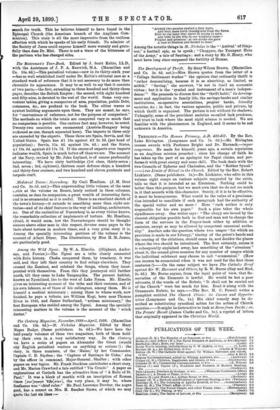The Development of Thrift. By Mary Wilcox Brown. (Macmillan and
Co. 3s. 6d. net.)—Miss Brown quotes from the letter of a "College Settlement worker" the opinion that ordinarily thrift is "rather demoralising, because it is so absorbing, so limited, so selfish." "Saving," she answers, "is not in itself an economio virtue ; but it is the symbol and instrument of a man's indepen- dence.' " She proceeds to discuss first the "thrift habit," its develop- ment and application in family life, the savings-banks and similar institutions, co-operative associations, peoples' banks, friendly societies, &c.; in fact, the various agencies, public and private, by which thrift is organised. The picture is not without its shadows. Unhappily, some of the provident societies so-called lack prudence, and trust to luck where the most rigid science is needed. We are familiar with the phenomenon in England, and it seems to be not unknown in America.






















































 Previous page
Previous page